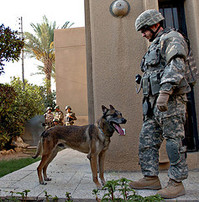Veterinary Corps: providing veterinary support within the military - and more

flickr photo courtesy of The U.S. Army
In a recent post, I talked about Military Working Dogs and their role in active duty and in peacetime. In order for them to be able to do their job though, working dogs (as they are referred to) need to stay healthy.
That's where a special group of professionals comes in. Established in 1916 and comprised of roughly 780 veterinarians and other veterinary medicine support staff, Veterinary Corps serves in a capacity that reaches further than you would expect.
Basic wellness care is paramount when thinking about a working dogs' needs, of course, just like any dog that you'll see in a civilian capacity. But other considerations that are common in an active duty setting with military dogs are pretty much what their human counterparts experience, considering the level and type of activity that they are immersed in day-to-day: minor injuries, like cuts and bruises.
Serious injuries aren't as common, thankfully, but the capacity is there to deal with those cases. Working dogs get the same level of consideration as injured soldiers. A first responder, (usually the dog's handler, who is trained by Veterinary Corps) assesses the situation, treats on-site and then transports to an in-field clinic. If it's determined that they cannot be handled there, they are transported via medical evacuation to a medical facility that can accommodate the issues — like Joint Base Balad, Iraq and Holland Military Working Dog Hospital at Lackland Air Force Base in Texas.
Joint Base Balad Veterinary Hospital is integral in other areas of the care of animals, primarily teaching. Iraqi veterinarians are educated in small animal medicine - an area that Iraqi vets aren't traditionally aren't exposed to in their own schools. Typically, vet students in Iraq deal with livestock.
Back in the field, military veterinarians monitor parasitic disease, too; in doing so it can help indicate any problems that might be brewing and affect humans.
Veterinary Corps operates in other capacities such as monitoring soldiers' food supply safety, treating animals in disaster zones, and more.
Read more on the work of Veterinary Corps here.
Lorrie Shaw is owner of Professional Pet Sitting, and a regular contributor to AnnArbor.com's pet section. She wrote the popular piece "Saving your pets life in a poisoning emergency - the basics". Reach her via e-mail and follow her pet adventures on twitter @psa2.

